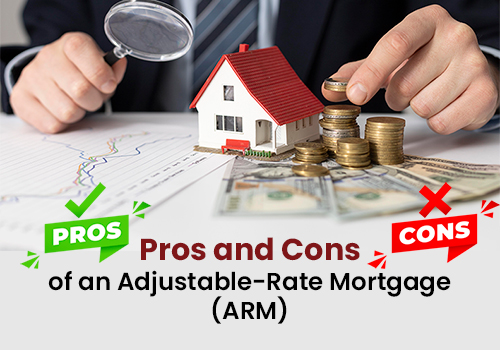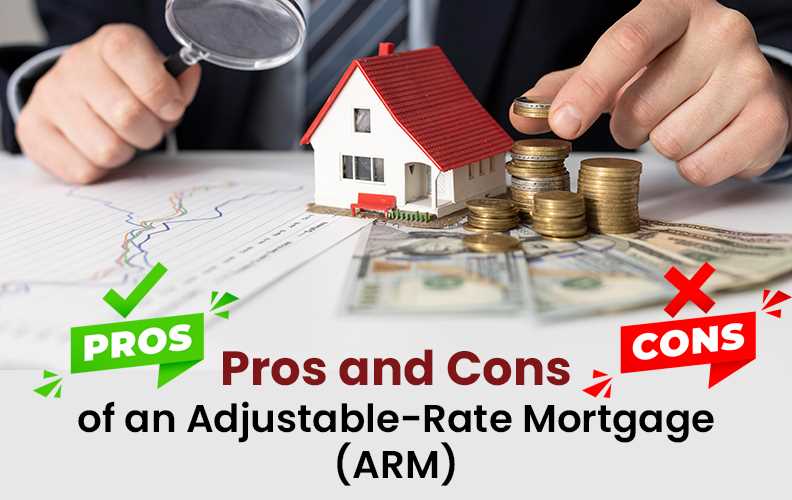Pros and Cons of an Adjustable-Rate Mortgage (ARM)
Wednesday, September 4, 2024

 When you're in the market for a new home or looking to refinance your existing mortgage, one of the biggest decisions you'll face is choosing the type of mortgage that best suits your financial situation. Among the most popular options is the adjustable-rate mortgage (ARM). While ARMs can be a great choice for some borrowers, they also come with certain risks. This article will explore the pros and cons of adjustable-rate mortgages, helping borrowers make an informed decision when considering an ARM.
When you're in the market for a new home or looking to refinance your existing mortgage, one of the biggest decisions you'll face is choosing the type of mortgage that best suits your financial situation. Among the most popular options is the adjustable-rate mortgage (ARM). While ARMs can be a great choice for some borrowers, they also come with certain risks. This article will explore the pros and cons of adjustable-rate mortgages, helping borrowers make an informed decision when considering an ARM.
Understanding the Adjustable-Rate Mortgage (ARM)
An adjustable-rate mortgage (ARM) is a type of home loan with an interest rate that changes periodically, typically in relation to an index. This means that your monthly payments can fluctuate over time. ARMs usually start with a lower fixed interest rate for a specified period—commonly 5, 7, or 10 years—before the rate adjusts annually for the remainder of the loan term.
The initial fixed-rate period is one of the most attractive features of an ARM, often making the loan more affordable at the outset compared to a fixed-rate mortgage (FRM). However, once the fixed period ends, the rate can increase or decrease based on the current market conditions, which is where the risk comes in. Knowing the pros and cons of adjustable-rate mortgages can help you figure out if this loan is right for your financial situation and goals.
Pros of Adjustable-Rate Mortgages (ARMs)
1. Lower Initial Interest Rates
One of the biggest advantages of an ARM is the lower initial interest rate. During the initial fixed-rate period, borrowers can often secure a rate that is significantly lower than what they would get with a fixed-rate mortgage. This can lead to substantial savings in the early years of the mortgage, making homeownership more affordable initially.
For example, if you're purchasing a home or refinancing at a time when fixed-rate mortgage rates are relatively high, an ARM allows you to lock in a lower rate for a few years. This could mean lower monthly payments and the ability to qualify for a larger loan. Working with a Bellevue real estate agent can help you make the most of this opportunity.
2. Potential Savings Over Time
Borrowers choosing an adjustable-rate mortgage may benefit from lower payments if interest rates remain stable or decline after the initial fixed-rate period. If the market interest rates decrease, your ARM rate could adjust downward, resulting in lower monthly payments than you might have with a fixed-rate mortgage.
This potential for savings can be especially appealing if you plan to sell the home or refinance before the initial fixed-rate period ends. In such cases, you might never experience the potential rate increase, thus enjoying the benefits of lower interest payments without the risk of future hikes.
3. Flexibility
An ARM can be an excellent choice for borrowers who don't plan to stay in their home for a long period. If you're confident that you'll sell the home or refinance before the fixed period ends, you can take advantage of the lower initial rate without worrying about future rate adjustments.
For example, if you're in a career that requires frequent relocations or you're purchasing a starter home that you plan to upgrade within a few years, an ARM might provide the financial flexibility you need.
4. Easier Qualification
The lower initial interest rate can make it easier to qualify for an ARM compared to a fixed-rate mortgage. Because your monthly payments are lower during the initial fixed-rate period, your debt-to-income (DTI) ratio will also be lower, potentially allowing you to qualify for a larger loan amount or meet lender requirements more easily.
This aspect of ARMs can be particularly beneficial for first-time homebuyers or those with limited income who might otherwise struggle to qualify for a mortgage.
5. Attractive Features for Investors
Real estate investors often favor ARMs due to the lower initial costs and flexibility. If you're purchasing a property as an investment, you may plan to sell or refinance within a few years, making an ARM's lower initial rate more attractive. Additionally, the lower payments can improve cash flow, which is crucial for managing rental properties.
Cons of Adjustable-Rate Mortgages (ARMs)
1. Interest Rate Uncertainty
The most significant disadvantage of an ARM is the uncertainty surrounding future interest rates. After the initial fixed-rate period ends, the interest rate on your loan will adjust periodically based on the prevailing market conditions. If interest rates rise, your monthly payments could increase substantially, potentially straining your budget.
For instance, if you start with a low initial rate but rates increase significantly over time, you could face much higher payments in the future, making it more difficult to afford your mortgage. This unpredictability is a major concern for many borrowers choosing an adjustable-rate mortgage, as it introduces a level of financial risk that isn't present with a fixed-rate mortgage.
2. Complexity of Loan Terms
ARMs can be more complex than fixed-rate mortgages, with various caps, adjustment intervals, and indexes that determine how and when your interest rate will change. Understanding the specifics of your ARM, including how the interest rate is calculated and what caps are in place, is crucial to avoid surprises down the road.
For example, ARMs often include rate caps, which limit how much the interest rate can increase at each adjustment period or over the life of the loan. However, these caps don't eliminate the risk of significant payment increases; they only limit the extent of the increase. This complexity can make ARMs less transparent and harder for some borrowers to understand fully.
3. Potential for Payment Shock
One of the most significant risks associated with ARMs is the possibility of payment shock, which occurs when your monthly payments increase dramatically after the initial fixed-rate period ends. This can happen if interest rates rise sharply or if your loan has a negative amortization feature, where your payments don't fully cover the interest, causing your loan balance to increase over time.
For example, if you start with a low initial rate and your rate adjusts upward after the fixed period, your monthly payments could jump by hundreds of dollars or more, potentially putting your home at risk if you're unable to afford the new payments. This potential for payment shock is one of the key cons of adjustable-rate mortgages.
4. Long-Term Costs
While ARMs often start with lower monthly payments, the long-term costs can be higher than those of a fixed-rate mortgage if interest rates rise over time. If you end up staying in the home longer than expected and rates increase, you could end up paying significantly more in interest over the life of the loan compared to a fixed-rate mortgage.
This is especially true if you don't refinance or sell before the rate adjustments begin. In some cases, borrowers may find themselves unable to refinance due to changes in credit, income, or market conditions, leaving them stuck with a higher rate and payments.
5. Refinancing Risks
Many borrowers who choose an ARM plan to refinance before the initial fixed-rate period ends. However, refinancing is not always guaranteed or easy. Changes in your financial situation, home value, or market conditions can make refinancing challenging or even impossible when the time comes.
For instance, if home values decline, you may not have enough equity to qualify for a refinance, or if your income decreases or credit score drops, you might not be eligible for a new loan with favorable terms. This risk makes it essential for borrowers choosing an adjustable-rate mortgage to have a backup plan in case refinancing isn't an option.
Who Should Consider an ARM?
Given the adjustable rate mortgage pros and cons, ARMs are best suited for certain types of borrowers and situations. Here are some scenarios where an ARM might be a good fit:
1. Short-Term Homeowners
If you plan to move or sell your home within the next 5 to 10 years, an ARM can be a smart choice. The lower initial rate allows you to save money on interest and payments during the time you own the home, and if you sell before the rate adjusts, you won't have to worry about potential rate increases.
2. Borrowers Expecting Income Growth
If you're early in your career and expect your income to increase significantly in the coming years, an ARM can offer initial savings while you get established financially. By the time the rate adjusts, your higher income might make any potential payment increases more manageable.
3. Real Estate Investors
Investors often prefer ARMs for their lower initial costs and flexibility. If you're investing in a property that you plan to sell or refinance within a few years, an ARM can improve your cash flow and maximize your return on investment.
4. Borrowers with Strong Financial Stability
If you have a solid financial cushion and are comfortable with some level of risk, an ARM can offer initial savings that can be used for other investments or financial goals. However, it's crucial to be prepared for the possibility of higher payments in the future.
Who Should Avoid an ARM?
While ARMs can be beneficial in certain situations, they aren't suitable for everyone. Here are some scenarios where a fixed-rate mortgage might be a better option:
1. Long-Term Homeowners
If you plan to stay in your home for the long term, a fixed-rate mortgage provides stability and peace of mind. You won't have to worry about future rate increases, and your monthly payments will remain consistent throughout the life of the loan.
2. Risk-Averse Borrowers
If you prefer financial predictability and want to avoid the uncertainty of potential rate increases, a fixed-rate mortgage is likely the better choice. The security of knowing exactly what your payments will be each month can outweigh the initial savings of an ARM.
3. Borrowers with Tight Budgets
If your budget is already stretched thin, the possibility of higher payments with an ARM could be risky. A fixed-rate mortgage offers more stability and helps ensure that your payments remain affordable over time.
Conclusion
When weighing the adjustable-rate mortgage pros and cons, it's essential to consider your financial situation, future plans, and tolerance for risk. ARMs can offer significant savings and flexibility for certain borrowers, particularly those who plan to sell or refinance within a few years or who expect their income to increase. Consulting with a Bothell WA real estate expert can help you assess how these factors align with your home financing strategy.
Categories:
Market Update
We would like to hear from you! If you have any questions, please do not hesitate to contact us. We are always looking forward to hearing from you! We will do our best to reply to you within 24 hours !





